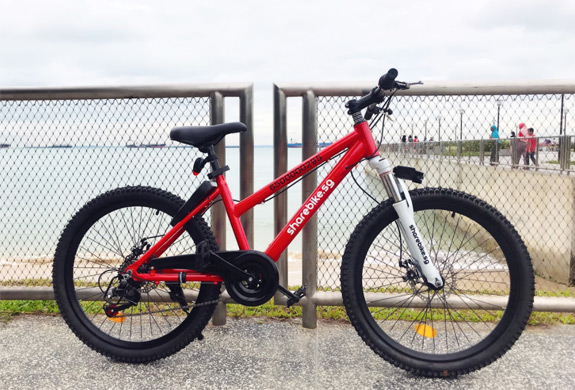UPDATE: As of July 2018, three bike-sharing companies in Singapore have ceased operations since the announcement of LTA’s new stricter guidelines. These include homegrowns oBike, GBike, and ShareBikeSG.
Everyone’s seen rows of share-bikes littered at the bottom of flats, piled carelessly at MRT stations, or left abused and abandoned in random ulu places. Of course, the profusion of these bikes are becoming a modern eyesore in Singapore, but the business model must be lucrative – why else would there be more new entrants to the market?
You (most) probably know of – or are using – services like ofo, obike, and moBike (if not, you can read about their system here). After they exploded into the market, there have been newer players like GBikes, SGBike, and ShareBikeSG, the only operator providing mountain bikes.

ShareBikeSG
ShareBikeSG is currently the only operator that offers mountain bikes, which come with features such as front suspension and seven gears. Weighing approximately 13kg, it’s a lightweight bike to take with you on your next off-road outing (fancy tackling bike trails at Bukit Timah and Chestnut Nature Park?).
Identify the Bike: The mountain bikes come with an all-red body, with white front suspension.
Basket: No (duh) Multi-gear: Yes (7 gears)
Deposit: $49 ($9.90 promo until 31 Jan 2018)
Cost per ride: $1 per 30 minutes.
They run a Credit system where users with poor behavior may be subjected to higher rates, while users with higher credit points may enjoy discounted rates.
Finding/Parking: Like other bikes, they have a built-in GPS so you can find one near you. With just 1,500 bikes, they’re currently easier found in Holland-Bukit Panjang and Jurong-Clementi areas.
ShareBikeSG was the third operator to cease operations citing difficulty coping with new LTA regulations.
SGBike
SGBike is the first to ensure users park at a ‘geostation’ – those yellow bike boxes you see around town – which is encoded with a radio-frequency identification (RFID) field of 5m to 25m. Park outside the zone, and an alarm will sound; you’ll incur a penalty fee ($2 and $5) if you don’t move your bike. It’s also the first operator that unlocks bikes with EZ Link cards (or NETS Cards with EZ Link capability) that have been paired with your app.
Identify the Bike: White overall, with magenta baskets and wheel rims.
Basket: Yes Multi-gear: No
Deposit: No deposit required
Cost per ride: $1 per 30 minutes; $0.03 per minute thereafter
There are 2 Plans: the Basic Plan which allows you to use one bike at a time, or the Family Plan (monthly fee of $1) which lets you ride up to 3 bikes at a go, and is the only plan that allows you to tap your EZ Link card to unlock the bikes.
Finding/Parking: They have a built-in ‘geostation’ locator so you can find one near you. You’ll have to park within the yellow bike parking boxes, otherwise you’ll incur a penalty (and your bike alarm will sound). So far, they bikes are more easily found in Holland-Bukit Panjang and East Coast Park areas.

GBikes
GBikes is not a new company – it quietly launch 3,000 of its all-yellow bikes back in September. Much like its competitors, it runs on a similar app and charge a comparable rate per ride. The only difference, the company claims, is that their bikes are of higher quality with materials from Europe, catered to high stress loads. In a bid to prevent abuse of bikes, they have built-in alarms that sound should they be moved after they’re locked.
Identify the Bike: All-yellow bike, with a yellow panel covering the middle portion.
Basket: Sort of Multi-gear: No
Deposit: $49
Cost per ride: $1 per 30 minutes
Finding/Parking: Similar to other bike-share apps, you can locate them via GPS.
GBike was the second operator to cease operations citing difficulty coping with new LTA regulations.
Can’t cycle? No problem. Just last year, three (yes, three) companies have set up shared e-scooter services. Yup, we’re talking those electric-powered kick-scooters that food delivery folks use a lot.












